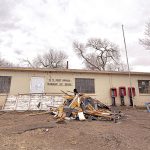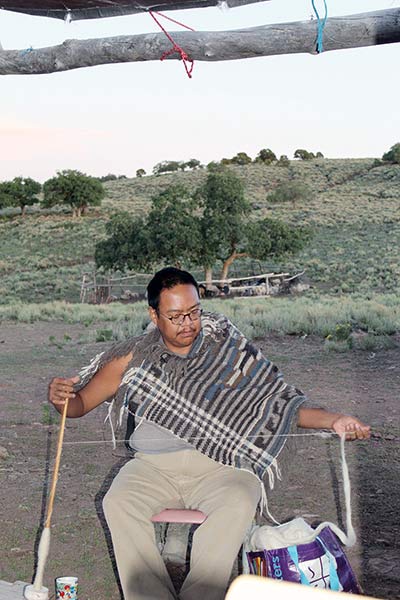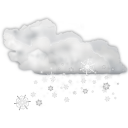
Surviving the Coronavirus Crisis: Diné Perspectives: ‘We’re in the middle of a war’
SHIPROCK
Traditional weaver Zefren “Ephraim” Anderson took every precaution to protect himself from COVID-19, but the virus still made its way to his doorstep.
This occurred through one brief, seemingly harmless interaction with a trusted friend who had been helping an elder who was an asymptomatic carrier of the disease.

Courtesy photo | Eliseo Curley
Zefren “Ephraim” Anderson spins Churro wool on the Carrizzo Mountain.
Anderson described the rage he felt about being exposed to the virus as overwhelming.
“I don’t know how to describe the betrayal, the anger and that I felt towards my friend and my relatives,” said Anderson. “My trust in what they were doing to protect themselves was just blown away.”
However, Anderson said that because it’s not possible to cut the people responsible out of his life, he consciously decided not to assign blame or hold grudges as it would negatively impact the relationships forever.
“It’s been an interesting journey,” he said.
By the time his friend tested positive for the coronavirus, Anderson was already feeling ill.
His friend had a headache for a day and then was “back to normal.”
Anderson, on the other hand, went down a route that landed him in bed for four straight days with a myriad of symptoms.
“The virus looks for weaknesses,” he said. “It just started with joint pain and then ant bites from the farm started swelling.”
Then came sore muscles, cramps, allergy-like symptoms and extreme fatigue.
Within a few days, Anderson could hardly stand up and finally could not get out of bed.
“By that time, it had moved from my bones into my blood,” he said.
Anderson said the pain would migrate throughout his body and he had severe headaches.
Pain relievers just exacerbated the symptoms.
“My nose and throat would swell up so much that even breathing through my mouth almost couldn’t give me enough air,” he said.
After Anderson’s fever finally peaked, his body temperature dropped to 89 degrees.
“When my body temperature fell, that’s when I started having stomach and digestive issues,” he said. “It was like I had food poisoning.”
Anderson says while the virus isn’t alive, it seeks to make copies of itself and take over biological functions.
As a public service, the Navajo Times is making all coverage of the coronavirus pandemic fully available on its website. Please support the Times by subscribing.
How to protect yourself and others.
Why masks work. Which masks are best.
Resources for coronavirus assistance
He also believes the coronavirus stops normal cell regeneration.
“When it got to my nose, I got the nose bleeds, and then the next week it started affecting my mind,” he said. “Once it reaches your nose, then it’s in your brain and that’s when you can present with symptoms that represent concussions, stroke.”
He said that part got to him the most.
“I would lose emotional maturity because I could not recall experiences,” he said. “I couldn’t remember peoples names or childhood memories. It was like the system that recalls memories and makes memories was just completely out of whack.”
He started having hallucinations.
“You see things, you feel people are whispering,” he said.
Through the worst of the illness, Anderson told himself as long as he could still communicate and get things done, he would not go to the hospital.
“The anxiety was when I went to sleep there was a chance I might not wake up,” he said.
‘I had to do it myself’
Now mostly recovered, Anderson says he doesn’t feel like he is the same person he was before getting sick. In the two months since he contracted the virus, he’s lost 30 pounds and still has stomach issues and other flare-ups.
“Any one of my symptoms that I had when I was sick can pop up and trigger a relapse even though I’m no longer contagious,” he said.
The mental flare-ups bring on the most anxiety, he says.
“I can be perfectly level-headed and normal and then feel like a bumbling, unsure teenager,” said Anderson.
He believes there is a dire need for mental health support groups for those recovering from COVID-19 who aren’t prepared for the amount of stress involved, which he likens to post-traumatic stress syndrome.
For that reason, he thinks veterans might be the best people to help survivors of COVID-19.
“There’s only so much a person can deal with without talking about it,” he said.
“To me, it’s like this is how I am for the rest of my days,” he said. “I’m more open, I’m more direct, because I could have so well have been a fatal case. I feel like I’ve been given a chance to make the world better for everyone else.”
Anderson believes the media isn’t talking more about the long-term impacts of COVID-19 because they want people to think “you get sick, you get well, and you stay well.”
He said he has had little follow-up from IHS. They never even sent contact tracers.
“I’ve had no interviews or directions from public health authorities,” he said. “No one contacted me wanting to know when and where I had been and who I had contact with. I had to do it myself.”
Several members of Anderson’s family and his friend’s family got sick and a few passed on from COVID-19.
The Navajo Nation Health Command Operation Center never called either, said Anderson, although a Shiprock CHR did work with the Northern Diné COVID-19 Relief Effort to bring some supplies and friends helped out.
Anderson thinks his blood plasma could be lifesaving for someone who is sick, but the system is not in place to make that happen on Navajo.
That’s for rich people, he said.
“There’s a lot of people around here who’ve gotten sick whose blood could help others, but our health officials and the Navajo Nation aren’t identifying us,” he said.
‘Why tempt fate?’
These days Anderson has no patience for those who place themselves above others.
He’s been calling people out for bullying or using their religion to justify poor public health choices.
“I have no time for someone who’s going to use this virus as a trial of fate,” he said.
And he has no regard for those who treat others inequitably.
“All of our beliefs, no matter what we believe, should be valued and we should be able to work together as human beings,” he said.
“You would think we would know what happens when you try to segregate beliefs,” he said. “We, as Navajos, should be able to work for the common good, which is the central core of Hozho.”
Anderson says some people are blaming those who contract the virus by saying it’s because of their lifestyle or because they are “a bad person.”
They want to talk like that, he said, because it makes them feel like they’re on the “winning side.”
“There is no winning side with this virus, because look at the people it’s choosing — our elders,” he said. “And if the virus has more time to copy, there’s more it’s going to do that could make it more benign, or deadlier.”
Anderson has been thinking about what happens to societies that lose major stakeholders, spiritual and cultural leaders and keepers of knowledge.
“When societies lose that, there’s more opportunity for change,” suggested Anderson. “Maybe for better, and maybe for worse.”
Right now the virus is forcing people to consider how well they are protecting their elders.
”Why tempt fate when all you had to do is stay home?” he asked.
Anderson believes that if everyone could just quarantine for two weeks, the coronavirus could be stopped in its tracks.
“If everyone in the world from the richest to the poorest could just have enough water and food and be alone for two weeks, the pandemic would end right then,” he said.
That would require unity, however, and commitment.
Anderson believes until people comprehend that following the rules and the science is best for the group, nothing is going to change.
“This is going to be our reality,” he said. “We’re looking at a two-year long haul to protect the vulnerable if we continue the way we’re dealing with it now.”
While social distancing is the way to control the spread of the virus, it is anathema to traditional teachings, he said.
“This is a test of whether or not or not we can accept something we know causes death and change our practices to suit it,” he said.
Fear of disease
Putting things in perspective, Anderson says that while the coronavirus has been a traumatic experience, Navajo has seen worse in the past.
“As scary as corona is, it’s not as scary as what’s been here before,” he said. “These diseases have been happening to us ever since the first peoples came into this region.”
He says many Shiprock relatives were lost to the 1918 Spanish Flu, and outbreaks of diseases like typhus and meningitis.
“There are families here who have stories of a whole family being sick and the last person remaining nailed the door shut on their home,” he said. “That was the reality of living in Shiprock.”
He said from 1918 to 1942, especially for those who didn’t have scientific knowledge, everything was a threat of disease and dying.
“All through the thirties and forties most Navajos would not look at you or talk to you if they didn’t know you for fear of disease,” he said.
He said people rarely visited their neighbors.
“This is where the tradition of honking the horn outside to say ‘hello’ started,” he said.
Now Anderson sees history is repeating itself.
“There are things in Mother Earth that will come out whenever things go bad or something is being done that isn’t within the design of this world,” he said.
Anderson says, for one, the global economy operates off of the blood and sweat of disadvantaged people.
“People are driven to such lengths to sustain their survival needs that they are breaking taboos and their sacred bond with their surroundings,” he said. “They are exposing themselves to situations that create diseases.”
The boundaries between humans, animals and nature in many developing countries have blurred as well.
“You have massive amounts of people in close quarters intermingling with wildlife and livestock under horrible sanitation conditions simply trying to survive,” he said.
Anderson says there are examples throughout history where Native American cultures and other civilizations have fallen after establishing a trade network in order to move goods and services and make elites more powerful.
“Native American oral stories talk about the ‘before times’ when Holy people became powerful, greedy and amoral, and spent their leisure time exploiting people to the point where they declared themselves gods,” he said. “With Navajo tradition, we have stories about what happens when a human declares himself above what is around them — the result is disorder and cannibalism when it all falls apart.”
The way to maintain power after all the resources are depleted is to use fear, he said.
“I’m not saying anything that we haven’t already talked about in our stories,” he said. “There is, in a sense, no prediction of the future because all we’re doing is repeating the past.”
‘There’s no Hozho’
Anderson has been encouraging people to attend to the traditional way of life that can sustain us into the future.
“We have all this time to work on the farm field, do weaving, herd sheep or help people or rebuild the community,” he said.
But many people are just complaining, he said.
“They aren’t making a difference because they want to feel superior or comfortable,” said Anderson.
“I see intellectuals yelling at people on Facebook, but yet they look down at a weaver or a farmer because they feel its menial and primitive,” he said. “They should just be Navajo.”
He’s offered to teach people farming if they have the motivation.
“There aren’t a lot of people who will work for hours moving dirt with just a bucket and shovel,” he said. “They think the work is beneath them and they can’t see the value they’re producing.”
With the climate changing, plants and animals are choosing to move to other places where they want to grow, he said.
“It’s our decision to help them grow in the areas we need them and that perpetuates their existence on our land,” said Anderson.
Anderson believes the people who commit to learning survival skills during the pandemic will be able to pass the knowledge on to future generations.
“I’m looking 400 years ahead,” he said.
There are decisions to be made that cannot be solved with a song and a prayer, that have to be made as a warrior, he said.
“I’ve been telling people, there’s no Hozho right now,” he said. “We’re in a world of Hochxo. We’re in the middle of a war.”








 Highway 264,
Highway 264, I-40, WB @ Winslow
I-40, WB @ Winslow